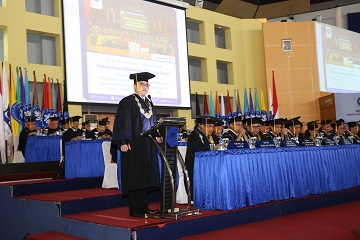During Graduation, IPB Rector Emphasized on Efforts to Face Food Crisis and Industrial Revolution 4.0

There are two big challenges that are the main concern of the Indonesian people today. “First, the global community is faced with the problems of the food, energy and environmental crisis, which then have an impact on decreasing the quality of human life,” said the Rector of IPB, Dr. Arif Satria in the Graduation and Submission of Diploma Stage 2018/2019 Academic Year Undergraduate Education Program, Veterinary Professional Education, Masters and Doctorate in IPB Environment, Wednesday (13/3) at the Dramaga Bogor IPB Campus.
Furthermore, the Rector of IPB said that in responding to this problem, the United Nations (UN) endorsed the global goals contained in the Sustainable Development Goals (SGDs) which were formulated through agreements between the leaders of countries in the world. The SDGs contain 17 points that aim to alleviate poverty, protect planet earth, and ensure prosperity for all. The achievement of SDGs requires high commitment and encourages a variety of transformations in terms of paradigms, policies, and behavior. Inclusiveness in development is a key factor in achieving SDGs and universities, including those who play an important role in this matter.
“Second, we are currently in the era of the Industrial Revolution 4.0. Although the consequences of the development of 4.0 technology have changed many established old structures, the presence of this era opens up new perspectives on the importance of collaboration to solve complex problems. the interests of sustainable and equitable development. These two challenges require readiness of human resources to be competitive and contribute to realizing the SDGs.
The Agenda of the Industrial Revolution 4.0 with the development of artificial intelligence, robotic, data sciences, internet of things, cloud, bio technology, big data, drones will increasingly bring this order of life not only to the condition of 4.0 but more advanced to society 5.0. Society 5.0 is characterized by digitalization which is not only in the industrial sector, but also in all aspects of human life,” continued the Rector of IPB.
The Rector of IPB emphasized that IPB graduates must be more adaptive and always ready to face the Society 5.0 era. The criticism of the World Bank on the competence of the Indonesian people focuses on four strategic sectors. Therefore, IPB graduates are prepared and must have competencies, among others: First, leadership, that is, leadership to prepare students with strong characters, especially in the leadership field. Both language skills, foreign language skills, especially English. Third, IT Literacy, where IT technology is the main feature of the Society 5.0 era. Fourth writing skills. Writing activities are important to express ideas and ideas that we have and new thoughts and innovations can be transmitted to the Society 5.0.”
The Chancellor emphasized his role through the launch of Agri-Maritime 4.0 to respond to the challenges of achieving the SDGs and the 4.0 industrial revolution in agriculture in the broadest sense. Agri-Maritime 4.0 is present to address the issues of de-selectivity of agrarian development, environmental degradation and natural resources, low social welfare, food insecurity, the low contribution of the agrarian sector to economic growth, and development inequality between regions in Indonesia.
“Agri-Maritime 4.0 integrates land and sea management in an inclusive manner involving complex social, economic and ecological systems, with the main approaches being used namely transdisciplinary, ecoregion-connectivity, integrated-particitipatory connectivity Agri-Maritime 4.0 emphasizes that all the same disciplines play an important role in solving the complex Agri-Maritime issue. ‘Creating Value’ as the main feature of Agri-Maritime 4.0 technology does not only involve one scientific discipline. An IT expert does not automatically have the ability to understand Agri-maritime technical, social, and economic problems, so collaboration between disciplines becomes a necessity,” said the Rector of IPB.
The Rector of IPB hopes that IPB graduates as future Agri-maritime actors as well as technopreneur and sociopreneur with a number of new competencies in accordance with the era of Industrial Revolution 4.0 and Smart Society 5.0. IPB graduates are superior and adaptive individuals for change and are able to support a more equitable economic transformation process, through the growth of technopreneur with start-up business and socio-preneur in community development through various innovations produced. IPB graduates are expected to be able to contribute to the achievement of the SDGs and become agents to accelerate the realization of Agri-Maritime 4.0 goals through their work in various fields of work and business.
The Rector explained, throughout 2018 and at the beginning of 2019, IPB had carved a number of proud achievements, both at the institutional level, education staff, and students. Institutional achievements include: IPB including the 100 best universities in the world, QS World University and Forestry Ranking, Top 40 The Most Sustainable University in the World and 2nd place in the UI Green Metric version at the end of 2018 , Best III PTN-BH Social Media Category at the 2018 Public Relations and LLDikti Public Relations Award by the Ministry of Research, Technology and Higher Education in early 2019.
IPB has 158,113 alumni. The existence of alumni has a strategic role in building the nation and state and building IPB in particular. At the graduation of this stage, IPB handed over diplomas to 800 graduates, consisting of 531 graduates of Bachelor programs, 25 graduates of the Veterinary Professional Education program, 211 graduates of master’s degree programs, and 33 graduates of doctoral programs. (RYS)


